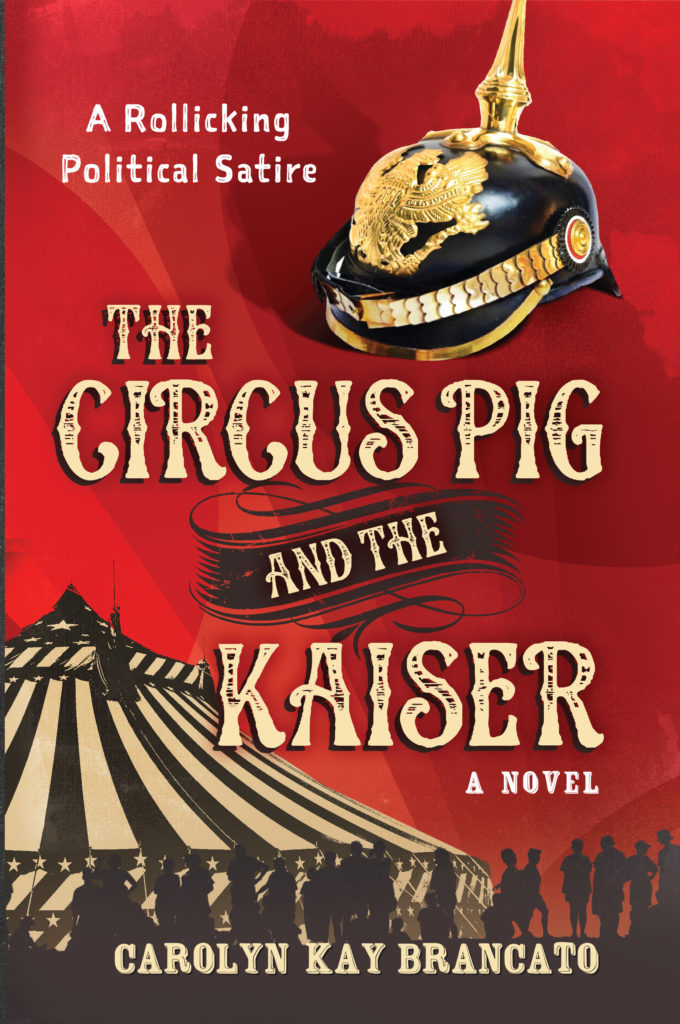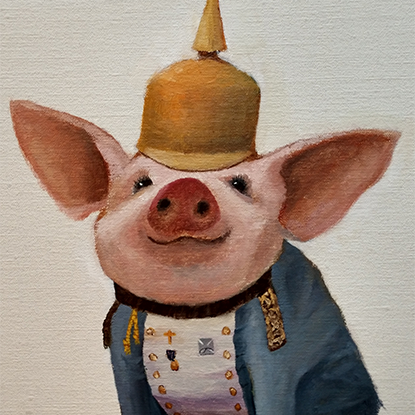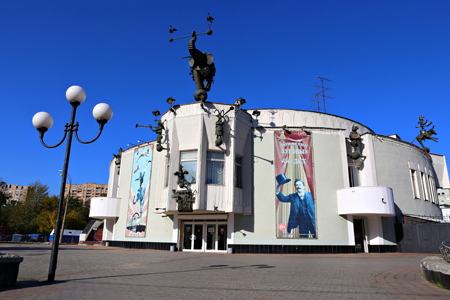
The Reviews are In!
"…This circus is an unlikely tour de force that heroically upsets the status quo. In this case, it is set in 1907 in a German border town where reverence for the hawkish and dictatorial Kaiser Wilhelm II is high. … The story that Brancato creates is an authentic, charming and heart-felt portrayal of a band of circus performers who are more like family with all a family's problems, passions, joys and of course love, which is also portrayed in all its complexities.
…Durov is a trainer of clever miniature pigs and he has a propensity for rousing the ire and unwelcome brutal retaliations of government authorities because of his deep belief in the freedom of expression in all forms, especially in the arts, and particularly in his parodying circus act, which makes scandalous fun of the powers that be. Durov has perfected a clever act with his dear Sasha, the star of the piglets, who, while wearing a uniform resembling that of the Kaiser, can flip a helmet upon her little head, characterizing to a tee the Kaiser himself. The local government loyal to the Kaiser in all matters is not pleased, especially Sergeant Major Wolfgang Dunsendorfer, who rallies his army of dragoons to put a stop to the circus…a nail-biter to the very end."
---Colin Harrington, The Berkshire Eagle
"Carolyn Kay Brancato brings an eye for detail, an ear for dialogue, and the heart of a true storyteller to give us characters to root for and thoughtful insights about the roles art and humor play in showing us who we are."
---Nell Minor, Editor, Miniver Press

The year is 1907. Vladimir Leonidovich Durov is an honorable but pig-headed pig trainer in a down-on-its-luck, Russian traveling circus. He is the eldest son in a proud circus family that no longer trains its beautiful white stallions, but is reduced to training pigs.
Durov is secretly in love with Natasha, a tall, awkward but high-born lady from Moscow. After a night of indiscretion with the womanizing circus owner Nikolai, she is horrified to find herself disowned and exceedingly unhappily married. Nikolai bullies everyone, insisting the circus can only survive by crossing the steep mountains from Russia into the more prosperous Prussian countryside. But in a drunken state, Nikolai steers their wagon over a cliff and dies. Deliriously happy at this turn of events, Durov sees his chance to bring the circus back from certain bankruptcy, win Natasha’s love and regain his dream of restoring his family’s honor.

Russian Stamp Showing Animal Trainer Vladimir Durov
Arriving in Germany, the circus is met with suspicion that it is filled with immigrants, gypsies and inbred foreigners. Durov hatches a scheme to impress Natasha by dressing up his prized pig to mimic the Kaiser with his ridiculously elaborate military dress — designed to whip up the people in a frenzy that will lead them into war. An obsequiously loyal-to-the-Kaiser dragoon, however, threatens to destroy the circus if Durov performs.
Desperate for the love of Natasha but stubbornly insisting on exercising his freedom of expression, Durov knows his decision to go on with his pig act could cause an international scandal and the loss of everything he holds dear. The novel is a heartfelt comedy about the lengths to which people will go to express their love for each other and for their precious artistic freedom — even in the face of authoritarian repression.
More about the novel
The Circus Pig and the Kaiser is a rollicking historical novel and satire that deals with freedom of expression under an authoritarian regime – a subject of great relevance today. It is based on a true historical incident. The author is indebted to the late Russian-American Nobel Laureate Wassily Wassilyevich Leontief for personally giving her the idea to look into the life of the Russian circus performer Vladimir Leonidovich Durov.
Professor Leontief was a lover of ballet and theatre and his interest in freedom of expression was long-standing. During his early years in the USSR, he sided with campaigners for academic autonomy and freedom of speech. He was detained several times by the Cheka, the precursor to the KGB. In 1925, he was allowed to leave the USSR and he emigrated to the U.S. Professor Leontief generously gave his time to the author and many others interested in perpetuating not only his economic theories, but also his ideals of freedom of expression.
The Durov family still runs a circus in Moscow, known for its revolutionary ways of training animals with positive reinforcement rather than cruelty. Vladimir Durov was, in fact, arrested in Germany in 1907 for an act of sedition — dressing a pig up to mimic the Kaiser. Apart from this one incident, however, all characters and events are strictly the product of the author’s imagination.




